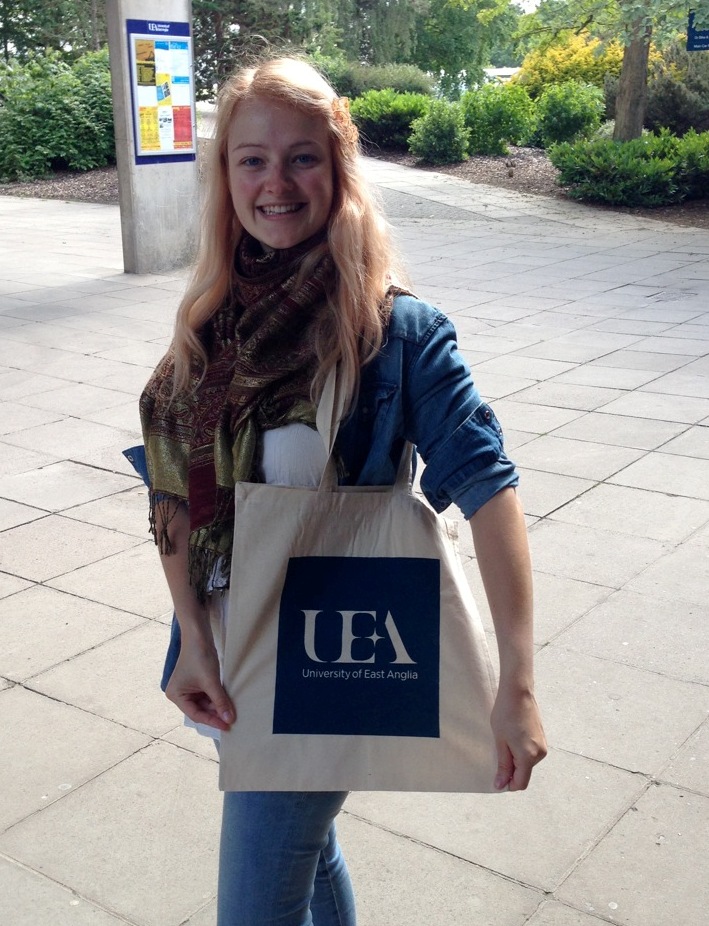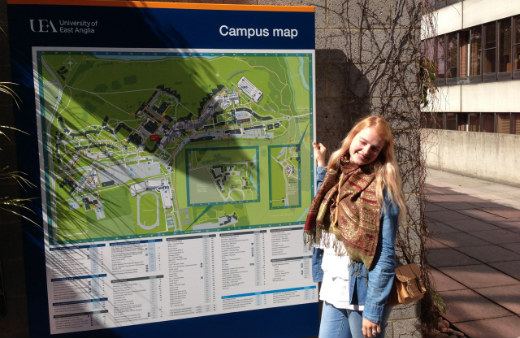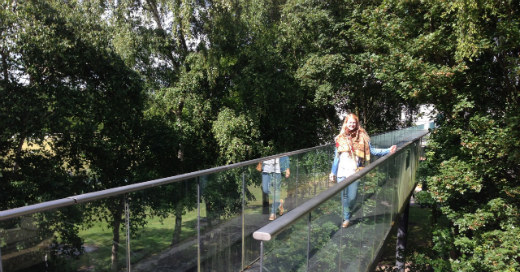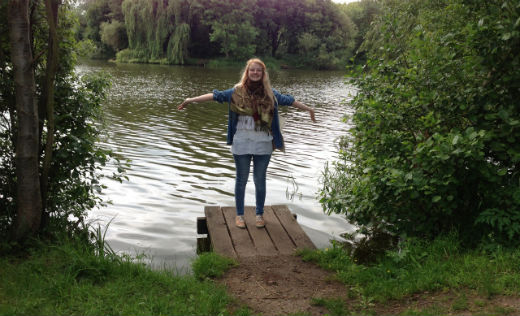successful admissions
of students enter the university of their choice
students consult Education Index when applying for universites
successful admissions
of students enter the university of their choice
students consult Education Index when applying for universites
Interview for Education Index has given a student of the graduate school at the University of East Anglia (University of East Anglia) - Xenia. In an interview with Ksenia told about study and life at UEA, as well as received a scholarship, funding their studies of Xenia on one of the three-year PhD programmes. "My advice – do not be afraid to go in touch with the University and professors, write them emails, call, send faxes, unless you are sure that you understand what is process of admission and what is required of you."
 EI: Hello, Xenia! Tell us a little about yourself (where are you from, how old you are). What are you doing in England?
EI: Hello, Xenia! Tell us a little about yourself (where are you from, how old you are). What are you doing in England?
Ksenia: I am 23, I am from Tver. I moved to England when I was 17 years old, first doing Foundation Year (Media Studies, 1 year), then a Bachelor's degree (Film Studies, 3 years), then Master's degree (Journalism and Media Studies, 1 year) and now doing PhD (Film, Television and Media) is writing a doctoral thesis that I hope will take me more than 3 years.
EI: In what year were you enrolled at the University of East Anglia(UEA)? Was it your first choice University, or you applied anywhere else? Why UEA? What drew you to this University?
Ksenia: University of East Anglia (UEA) I received in September 2013. I 5 years studied at the University of Sussex. Even when I was choosing a University, I had 3 favorites: Sussex, East Anglia and Warwick. By coincidence, I picked the Sussex, but I always wonder what it's like to be a student at UEA. So, when his turn came to do a PhD, I no doubt chose UEA. This University attracted me a lot: location (close to London), very beautiful campus, well-known in my field teachers, but the main reason of course was the scholarship. Unlike other universities offering me a special discount (30% -50%), UEA offered me full funding.
EI: you were at UEA? Tell us about your experience.
Ksenia: Admission to the PhD is very different from income for undergraduate or graduate programs and takes a very long time. I started to work on documents in September 2012 and received in April 2013. Before you officially apply for a place and a scholarship, you must determine the topic, write a Research Proposal (a detailed plan of their research). Next, you need a personal study of universities and teachers, because it makes no sense to apply to University, if there is no person suitable for the role of the supervisor for your topic. Finding the right teachers, I contacted each of them, some went for a preliminary interview. Having received their prior consent to be my supervisor, I gathered all the necessary documents and submitted them officially to the University. The process is complicated by the fact that every University have their own rules and their deadlines. Initially, my list was of 20 universities, but actually I applied I only to a few. UEA was my goal, but for insurance I applied in some institutions.

EI: if you are Faced with any difficulties when entering University as a foreign student? If so, tell us about it in more detail.
Ksenia: My arrival was simple from the standpoint that I was already in England, had the experience of studying here and two English degrees (BA, MA). I don't know what it's like to apply for the PhD from Russia, but I suspect that the process will be similar. My advice – do not be afraid to go in touch with the University and professors, write them emails, call, send faxes, unless you are sure that you understand what is process of admission and what is required of you. I sent a plan of their study, many academics, and almost all answered me, sent comments, advice, up to that helped me to correct grammatical errors, to increase my chances of getting a place and scholarship.
EI: does UEA scholarships for international students? Do you know of students that have received scholarships?
Xenia: As a person who has received a scholarship from UEA, I can say that this is one of the most "generous" universities, which does not oppress students, and puts them on the same tier with students from the UK and the European Union. Many scholarships are open to all, for the UEA is the most important talent and knowledge of the person, not the country from which he hails. All information about the offered scholarships is on the University website. Just enter the word "scholarships" (or "funding") into the search box and review the results.
EI: what kind of program you're learning? At what rate? What are your impressions of the program?
Xenia: I'm in my first year of PhD. The impressions are very mixed, I thought learning would be much easier and will have plenty of free time. In fact, PhD is completely absorbs your life. Those who hope to earn and learn at the same time have more time to think seriously, because time does not suffice catastrophically. Classes as such – mandatory lectures and seminars - we have. Instead, the University offers Personal and Professional Development (PPD) program consisting of short courses (some last only a few hours, others for entire semester) that are configured to give students practical skills seminars, lectures, work in the archives and so on. Together with his supervisor each student is its own individual program and runs only those courses which interest him or necessary for research and teaching.
EI: Who studies with you at your program? A lot of foreigners, Russian-speaking students? Were you able to have close friends, and who are they – Russians, foreigners, British? With whom it is easier to find a common language?
Xenia: As I said earlier, a PhD is something completely different than the bachelor and master's degree. This is a new stage of life, the last stage of education. Teachers treat us not as students but as colleagues. The same new relationship I felt to him and among the people with whom I study. When I was studying for my bachelor's and master's programs to make friends among the English, I did not work, was not common ground. My friends were from different countries: Turkey, Germany, and Japan. A PhD is no differentiation by nationality, nobody asks "where are you", even if you have an accent. To all interested in the topic of your research, your work. Me learn English, Europeans, Americans, students from Asia. To find a common language easily with all, the sense of community and support.
EI: Tell our readers about your role as “Student Ambassador”, which means that this role what are your responsibilities? Why did you decide to do it and what do you see the advantages for yourself, for your future career?
Ksenia: I started to work as Student Ambassador in my previous University of Sussex. When I got to UEA, decided to try again to get this working, and I managed. The responsibilities are very different, and depend on how much time the student can and wants to work. I have little free time, so my job mostly consists of checking email and social networks, response to students, assistance in translation. You can still conduct tours of the campus to make presentations about student life, conduct Skype conferences, to meet foreign students and so on.

EI: What do you do in your free time? Do you have a hobby? Are you in any student clubs? Tell us a little about it.
Xenia: At the beginning of each new academic year at UEA is fair of student community (student societies). This year there was so much that was dizzying! I joined the yoga society, salsa society and film society. Each community holds events that give the opportunity to meet new people, discover new books or movies, depending on your interests, to travel around England and Europe. There is a community that brings together students from the same country, for example, Russian Society or French Society.
EI: Tell us a little bit about the city Norwich. What are the pros and cons you see for yourself? Is it easy to find housing, jobs, convenient transportation, and rich if night life Norwich?
Ksenia: Norwich is a small and quiet town. For students who are looking for excitement and fun, clubs, concerts and the like, it is unlikely to fit. For this you need to go to London (2 hours from Norwich). I Norwich attracted by its low cost: rent a house much cheaper here than in London or in the South of England. In Norwich no problem with Parking, which is a huge plus for me since I drive a car. Despite the fact that Norwich is a medium-sized city, there are plenty of shops, cafes and restaurants. 20 minutes by car or bus and you are at sea. The beaches in this part of England, in my opinion, the most beautiful long coastal line, luxurious, clean sand and pristine nature.

EI: What are your plans after graduation? Where would you like to live and work in the future in England, in Russia or somewhere else? Does the University find a job after graduation, especially for international students?
Xenia: After completing PhD I want to stay in England, to teach and to do research. The University has a whole Department (Careers Centre), whose mission is to help students find jobs, prepare for interviews, and so on. Seminars for foreign students, explaining in detail how the employment in England and that this process represents. You can also get advice on the visa needed to stay and work in England.
EI: Ksenia, thank you very much for this interview! What would you like to say in closing to our readers?
Xenia: I would like to wish everyone good luck in entering! The choice of University is one of the most important decisions of your life so take your time, think about it carefully. Feel free to write to us, the ambassadors, we have at each University and waiting for your emails, messages in Facebook and Twitter. Do not be ashamed of an accent or limited English skills, write letters to the University and the teachers, they will understand you and will be happy to help you.
>> Read more about the University of East Anglia
>> To the list of programs, the University of East Anglia